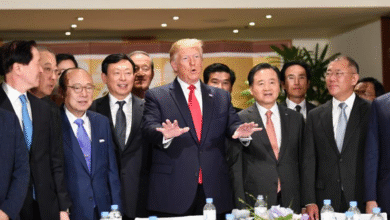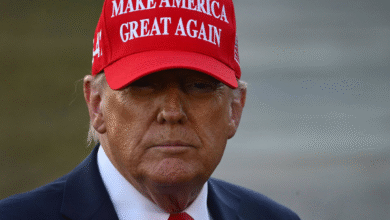L3Harris Technologies Settlement in False Claims Case
In a significant development for the defense contractor, L3Harris Technologies has reached a $62 million settlement regarding a false claims case linked to the company’s dealings with the U.S. military. The allegations assert that L3Harris misrepresented pricing information for equipment sold under government contracts, raising concerns about procurement integrity. This settlement coincides with the company’s role in modifying a luxurious 747 jet, gifted by Qatar, to serve as President Donald Trump’s new Air Force One. Although L3Harris expressed satisfaction in resolving the issue, it emphasized no admission of fault was made during the agreement process. This situation highlights the ongoing scrutiny over Department of Justice (DOJ) settlements in the context of military acquisitions.
In an intriguing turn of events for L3Harris Technologies, the company has successfully navigated a legal challenge associated with its contract work for the U.S. military. The recent agreement, which involves a substantial financial payout, stems from a false claims investigation that put a spotlight on the accuracy of pricing data submitted by the firm. This settlement aligns with L3Harris’s contract to modify a Boeing 747 for governmental use, specifically as the new Air Force One under President Trump. Resolving this matter under the auspices of the Department of Justice (DOJ) underscores the importance of transparency and accountability in defense contracting. The implications of this settlement will likely resonate throughout the industry, influencing future procurement processes and corporate governance.
Understanding the L3Harris Technologies Settlement
In a significant development, L3Harris Technologies has agreed to a $62 million settlement in response to allegations stemming from a false claims case. This resolution relates to accusations that the company misrepresented the pricing of crucial equipment sold to the U.S. military, particularly between 2006 and 2014. The firm, involved in modifications for the presidential aircraft, commonly referred to as Air Force One, emphasized their satisfaction in amicably resolving the matter with the Department of Justice (DOJ), clearly stating this was settled without an admission of liability.
The allegations highlight the serious nature of compliance in government contracts, especially for defense contractors like L3Harris Technologies. Misrepresentation of pricing can undermine trust in the procurement process. Despite the settlement, L3Harris retained its commitment to integrity, reaffirming its dedication to accurate cost data and ethical practices in government dealings. This settlement illustrates the importance of transparency and accountability within U.S. military procurement practices, particularly for vendors engaged in critical projects.
Impact of False Claims on Defense Contracts
The implications of false claims allegations are profound, particularly in the defense sector where contracts involve taxpayer dollars and national security concerns. L3Harris Technologies’ recent settlement not only results in a substantial financial payout but raises questions regarding the trustworthiness of pricing data presented by defense contractors. Such cases influence perceptions of the integrity of the procurement process, which is essential for maintaining confidence among stakeholders in the U.S. military’s operations and budgeting.
Furthermore, these false claims can lead to stricter regulations and increased scrutiny of defense contracts. For L3Harris Technologies, while they have resolved this particular issue, it could affect their future contract opportunities with the government. The scrutiny that comes from such settlements often prompts contractors to reevaluate their pricing strategies, compliance training, and reporting practices to avoid future disputes, thereby ensuring that they align more closely with the ethical standards expected in government dealings.
L3Harris and Air Force One Modifications
The transition of the new Air Force One aircraft has been a topic of intense public interest, especially following the recent developments surrounding L3Harris Technologies. While the company is tasked with modifying a 747 jet for the Trump administration, the recent $62 million settlement has brought additional attention to the project’s integrity and the quality of the services provided. The DOJ’s scrutiny of previous actions might lead to heightened public concern about L3Harris’s ability to deliver on such a prestigious governmental project.
As L3Harris Technologies works on the modifications of Air Force One, it must reassure both the government and the public of its commitment to honest practices and excellence in execution. The company’s focus will likely shift towards enhancing transparency and compliance to avoid any doubts about their capabilities, especially in light of recent allegations. The successful modification of President Trump’s Air Force One jet will not only demonstrate their technical competency but also their corporate responsibility, influencing future opportunities for engagement with the U.S. military.
The Role of the DOJ in False Claims Litigation
The Department of Justice (DOJ) plays a crucial role in addressing false claims within government contracts, acting as a watchdog to ensure that contractors uphold ethical standards. In the case of L3Harris Technologies, the DOJ’s intervention in the $62 million settlement serves as a reminder of the potential consequences of misrepresentation in governmental dealings. The investigative process and subsequent settlement reflect the DOJ’s commitment to safeguarding the integrity of public spending and enforcing accountability among contractors.
By scrutinizing contract proposals and pricing data, the DOJ works to maintain fairness in the procurement process. The allegations against L3Harris concerning their earlier contracts push for greater emphasis on compliance and accurate reporting in future engagements. The DOJ’s decisive actions encourage other contractors to adhere strictly to ethical guidelines, understanding that the consequences of false claims might not only lead to financial penalties but also damage reputations and operational capacity in the competitive field of defense contracting.
Negotiations and Settlements in Defense Contracting
Negotiating settlements in defense contracting is often a complex and sensitive process, as seen in the case involving L3Harris Technologies. The firm’s decision to settle for $62 million shows that resolving disputes swiftly can be advantageous to all parties, especially when future contract opportunities are at stake. Settlements can help companies avoid lengthy litigation, which can tarnish reputations and distract from critical operations.
In defense contracting, where relationships with the U.S. military are vital, maintaining a positive standing is essential. By negotiating an amicable resolution without admitting fault, L3Harris seeks to shift focus back to their core competencies and ongoing projects. Such strategies often involve a careful cost-benefit analysis, weighing the impact of public perception against the risks associated with prolonged legal battles.
Public Perception and Corporate Responsibility
Public perception plays a critical role in defense contracting, particularly in light of allegations such as those faced by L3Harris Technologies. The recent settlement concerning false claims may cast a shadow over the company’s reputation. However, how L3Harris manages this perception can significantly influence their standing with clients and stakeholders. By being transparent about the settlement and committing to uphold high standards, they can work towards reestablishing trust.
Moreover, corporate responsibility in the defense sector involves adhering to ethical practices, not just in compliance with the law but also in cultivating public confidence. L3Harris’s commitment to excellence and transparency will be scrutinized by the public and potential clients alike. Their ability to navigate these challenges effectively can enhance their image as a responsible contractor and may ultimately lead to greater opportunities within the U.S. military and beyond.
Lessons from the L3Harris Technologies Case
The case surrounding L3Harris Technologies offers important lessons for defense contractors regarding compliance and ethical standards. One vital takeaway is the significance of accurate pricing data when dealing with government contracts. The false claims case highlights how deviations from truthful reporting not only attract legal scrutiny but can also tarnish a company’s reputation and operational viability in an already competitive field.
Additionally, the settlement underscores the necessity for stringent internal controls and compliance mechanisms within defense contracting firms. It serves as a reminder that adherence to ethical guidelines and maintaining transparent communication with governmental bodies is paramount. Companies like L3Harris need to continuously reassess their practices to ensure integrity throughout their operations, mitigating risks associated with potential legal repercussions.
The Future of Defense Contracting Post-Settlement
The fallout from the L3Harris Technologies settlement raises questions about the future landscape of defense contracting. As companies within the sector navigate increased foci on transparency and accountability, there is a likelihood of evolving regulations that may introduce stricter compliance measures across the board. This shift could impact not just companies with past allegations, but also set a higher standard for all defense contractors striving to establish ethical reputations.
Moreover, the L3Harris settlement could lead to other contractors re-evaluating their pricing strategies and compliance training programs, ensuring that they align with the highest ethical standards. As the U.S. military landscape continues to evolve, maintaining trust and integrity in defense contracting will be crucial for securing future contracts with governmental agencies.
Governmental Oversight and Accountability in Defense Contracts
Government oversight in defense contracting is essential for ensuring taxpayer dollars are used ethically and effectively. The recent settlement involving L3Harris Technologies serves as a case study for the importance of accountability in the procurement process. By holding companies accountable for false claims, the Department of Justice reinforces the principle that integrity is non-negotiable within the defense sector.
As oversight agencies like the DOJ continue to address these issues, it may prompt a cultural shift within companies engaged in government contracts, particularly in terms of self-regulation and compliance divestment. The environment of scrutiny may drive firms to prioritize ethical practices and develop robust mechanisms for reporting and transparency, ultimately fostering a healthier marketplace for defense contracting.
Frequently Asked Questions
What is the L3Harris Technologies settlement about?
The L3Harris Technologies settlement involves a $62 million agreement to resolve allegations of false claims regarding misrepresentation of equipment prices sold to the U.S. military. This cases relates to transactions between October 2006 and February 2014, where L3Harris failed to disclose accurate pricing data.
How much is the settlement amount for L3Harris Technologies?
L3Harris Technologies has agreed to pay $62 million to settle allegations concerning false pricing claims made to the U.S. military.
What allegations were made against L3Harris Technologies in the false claims case?
In the false claims case, the DOJ alleged that L3Harris Technologies misrepresented the costs associated with equipment sold to the U.S. military, failing to provide accurate, complete, and current pricing data during contract proposals.
Has L3Harris Technologies admitted fault in the settlement?
No, L3Harris Technologies stated that the settlement was reached without any admission of fault or liability regarding the allegations of false claims.
What role does L3Harris Technologies play in Air Force One modifications?
L3Harris Technologies was contracted to assist in modifying a luxury Boeing 747 jet from Qatar’s royal family, which is intended to be used as the new Air Force One for President Donald Trump.
When did the allegations against L3Harris Technologies originate?
The allegations against L3Harris Technologies originated from pricing proposals submitted between October 2006 and February 2014 under various government contracts.
What did the DOJ state about L3Harris Technologies’ pricing practices?
The DOJ indicated that L3Harris Technologies falsely certified compliance by failing to provide accurate pricing data in government contract proposals, which constitutes a basis for the false claims case.
What was the response of L3Harris Technologies to the settlement?
L3Harris Technologies expressed satisfaction with amicably resolving the matter, reaffirming their commitment to maintaining integrity in the government procurement process.
Will L3Harris Technologies continue working on Air Force One after the settlement?
As of now, L3Harris Technologies has not confirmed whether it will proceed with its role in the modification of Air Force One following the settlement.
What does the DOJ settlement imply for the future of L3Harris Technologies?
The DOJ settlement allows L3Harris Technologies to close this chapter without admitting liability, which could enable them to continue government contracts while emphasizing compliance and integrity in future dealings.
| Key Points | Details |
|---|---|
| Settlement Amount | $62 million |
| Allegations | Misrepresentation of equipment prices sold to the U.S. military. |
| Background | L3Harris involved in modifying a 747 jet for President Trump’s Air Force One. This jet was gifted from Qatar’s royal family. |
| Statement from L3Harris | Pleased to resolve matters amicably without admission of fault. |
| Duration of allegations | Claims relate to contracts from 2006-2014. |
| Nature of False Claims | Did not disclose accurate pricing data and falsely certified proposals. |
| Legal Status | Settlement is not an admission of liability by L3Harris or a concession by the U.S. |
| Recent Developments | Formation of a task force to address air traffic control equipment issues at Newark airport. |
Summary
The L3Harris Technologies settlement marks a significant resolution in the false claims case concerning misreported equipment prices for military contracts. By agreeing to pay $62 million, L3Harris has emphasized its commitment to resolving the matter amicably, without any admission of fault or liability. This settlement stems from allegations involving contracts spanning from 2006 to 2014, where the company was accused of failing to disclose complete cost data. As L3Harris moves forward, their involvement in the modification of President Trump’s new Air Force One is a focal point, but the company insists that the settlement has no impact on that commitment.




